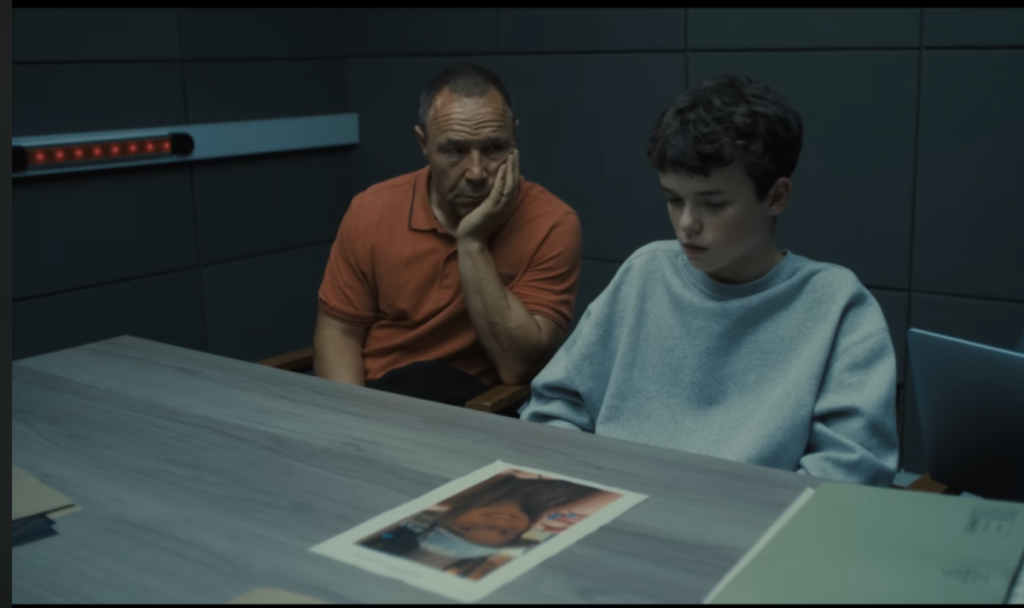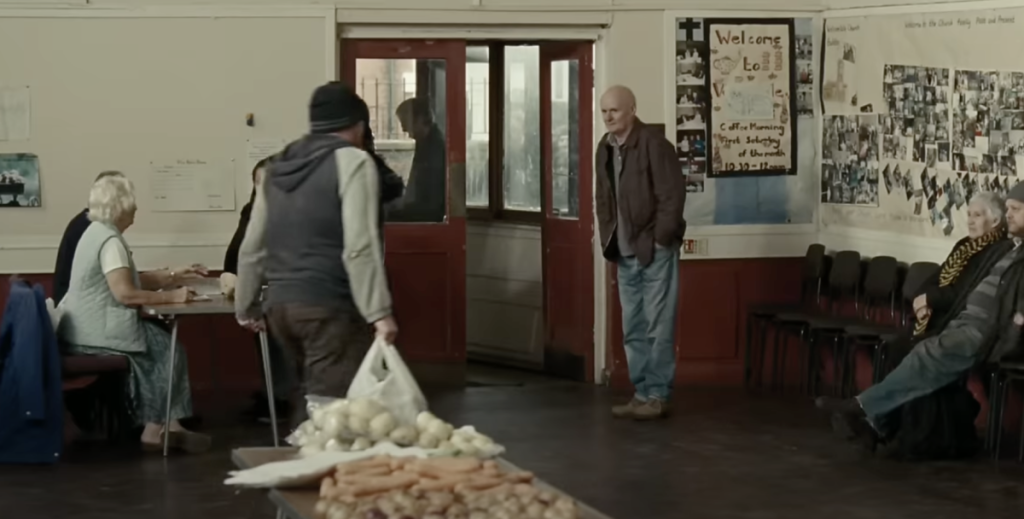
Netflix’s new mini-series Adolescence begins with the police violently bursting into 13-year-old Jamie Miller’s family home one early morning and arresting him on suspicions of murdering his classmate, Katie. Jamie is taken in for questioning and his sister and parents, shell-shocked, rush to the police station. Terribly nervous and clueless about the entire procedure, Jamie’s father Edie sees his wife Manda typing something on her phone and immediately snaps, “Well, don’t be letting everyone know what’s happening. We haven’t got a clue ourselves yet, love.” Manda, still sobbing and slightly angry, hits back with the words, “I am texting Susie to make sure our house is okay. We haven’t got a door anymore, if you remember.”
The discussion around Jack Thorne and Stephen Graham’s immensely popular drama has only grown since its release. The four episode mini-series has set a new Netflix record with a whooping 66.3 million views in the past two weeks and with a 99% Rotten Tomatoes score. Adolescence is about so many things – from male rage to incel culture. But something central and intricate to the mini-series, so poignantly captured in this moment of conversation between Jamie’s parents, almost seems to elude our eyes – the question of class.
The series writer Jack Throne has said in an interview: “I think the story of male rage is as old as time. But the way that male rage is being empowered by two things really. A culture that’s falling apart and a socio-economic system that’s not helping anyone, but also the internet and social media. You know, a conversation as a society, we need to have.” Adolescence is a story of a working-class family, but that aspect almost completely disappears from liberal discourse. Ironically, this was raised by commentators from the Right who claim that the series “demonises white working class boys”.

A still from Adolescence. Photo: Screengrab from video.
Anger and hopelessness
It is important to see how this mini-series aims to imagine teenage hopelessness in the neoliberal era. The makers of Adolescence have stressed repeatedly that it is not a whodunit story, but the focus is on why. For instance, in the second episode, the police try to look for answers at Jamie’s school. The two detectives, Luke Bascombe and Misha Frank land at the public school to find students bullying other students, teachers constantly screaming at the top of their voices to control them, false alarms blaring and nasty fights at the tennis court. At one point, Bascombe desperately wants to know from the school teacher Mr. Malik about Jamie and if there were any signs of unhappiness. Malik fumbles in anger and frustration, “I am just a tutor…I don’t, I don’t…I wouldn’t know, you know? … Look, these kids are f*cking impossible. I mean, what am I supposed to do?” No one seems to have any answers. The two detectives go from one classroom to another and at the end, Bascombe frustratingly asks Frank, “Does it look like anyone’s learning anything in there to you?”
Isn’t it the same story almost everywhere? The public education system is crumbling fast as funding is drained – resulting in decaying infrastructure, clueless teachers with unmanageable class sizes, terrible pay scale and angry teenagers, mostly from poor and marginalised backgrounds. Schools are facing death by a thousand cuts.
The next and penultimate episode of Adolescence is perhaps the most talked about thus far. Set after seven months of the horrific murder, clinical psychologist Briony Ariston meets Jamie in a room at the juvenile detention centre to prepare a pre-sentence offence report about his state of mind. Critics have written extensively about the terrific performance of the young anger, Owen Cooper, in this episode and how the 13-year-old, nudged by the psychologist, turns menacing, not wanting to listen to a woman. But they miss something else: the sheer class difference between them, as perceived by Jamie. This is crystal clear from the very beginning of their conversation:
Jamie: You’re posh, aren’t ya?
Briony: No, I am just not from where you’re from.
Jamie: Well, what do you call bread if you don’t call it slice?
Briony: Mm, bread.
(Both laugh)
Jamie: You’re posh.
Briony: If it makes you happy that I am, Jamie, then I am.
Jamie: Well, what do you call your grandad? Bet you call him “Grandpa”.
Briony: I don’t.
Jamie: I bet you do.
Briony: I call him “Pop-pop”.
Jamie: What? Do ya?
Briony: Yes, I do.
Jamie: Wow! (Laughs) Jesus, I have not heard that before.
Briony: I don’t know why. May be he asked me to call him that. I am not sure.
Jamie: God, you are really posh.
Minutes after, on being asked whether his father likes his job, Jamie snaps back, “He fixes toilets. What do you think? He works hard. Long hours. You get the best money from emergency plumbing out of hours.” One can clearly feel the anger and shame in the curtness of Jamie’s voice.

A screengrab from ‘Adolescence’ shows the young protagonist’s father’s work vehicle.
Imagination beyond claustrophobia and despair
Despair and helplessness continue to run the breadth of the final episode. Edie’s work van is vandalised with bright yellow paint and he doesn’t have enough money to get it re-painted. The frustrations build, and culminate into his furious outburst.
Adolescence draws from the long history of British cinema’s imagination of working class men, especially the work of Ken Loach.

A still from Ken Loach’s ‘I, Daniel Blake,’ showing the protagonist standing at a food distribution centre.
Loach, one of the greatest chronicler of proletarian realities, once remarked: “These are such dark times and we need to identify hope. And I think it’s important that hope is not wishful thinking; it’s not sending a letter to Father Christmas and posting it under the chimney. It has to be the real possibility of change for the better and a pathway to do it. And I think the hope is genuine: it is the strength of solidarity for the working class.” But in the universe of Adolescence, there is no space for hope in the dark times, no potential for solidarity. Reviewers have often called this mini-series harrowing and heartbreaking. And it is. But though brilliant in terms of performances and technical mastery, the narrative is primarily framed through upper-middle class gaze. There is no doubt that some of the stunning moments in Adolescence try to capture the class perspective, but these often become fleeting.
This probably explains the massive popularity of the mini-series and the conversations around it on television and digital media. These conversations primarily remain limited to liberal middle-class anxieties of streaming platform audiences. The makers of Adolescence also, in most of the cases, only highlight our perplexities about troubled teenagers in the dark corners of social media. The show creator Philip Barantini said in an interview: “The biggest win for me is that we’ve started this conversation. We may have changed people’s thinking in terms of what their children are up to in their bedrooms, what are their influences on social media. When I was growing up, I didn’t have phones or social media, no internet. I would be in my bedroom playing board games or a keyboard or whatever. And we were safe. But now, one of the most dangerous places for these kids is their bedrooms, and that’s horrific.”
Of course, the conversation around the manosphere and cyberbullying are extremely urgent. But aren’t these ever widening inequalities often weaponised against gender equality? Also, is it possible to imagine working class lives beyond hopelessness and claustrophobia? Before we celebrate Adolescence as all-time cinematic masterpiece, we probably need to ask these difficult questions.
Agnitra Ghosh teaches Mass Communication and Journalism at Jadavpur University.




